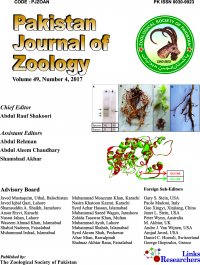Cryptosporidium is a protozoan parasite causing diarrhea in human and animals. This study has been aimed to find out its prevalence and chemotherapy of cryptosporidiosis in goats in three selected districts of southern Khyber Pakhtunkhwa (KPK), Pakistan. A total of 1440 fecal samples were collected from goats, 120 samples per month from each of 3 districts for twelve months. Identification of oocysts was done through conventional acid fast ZN staining. Prevalence in District Bannu was 48/480 (10%) followed by District Lakki Marwat12.08 % and in Kohat 19.16 %, respectively. Overall prevalence in three Districts was 13.75%. The highest month wise percent prevalence was recorded during July/August 25.83%, 26.66% with lowest in December 0.83%. On seasonal basis overall highest prevalence was during the summer season 21.87 %, followed by autumn 13.75 %, spring (11.66%) and the lowest in winter 6.66 %. Similarly, on age basis, the overall highest percent prevalence was 20.46%, 13.73% and 8.27% at the age of 1, 1-2 and 2-3 years, respectively. While on sex basis, non-significant (P<0.05) 15.66 % and 13.91% prevalence was found in female and male animals, respectively. Chemotherapeutic trial of three allopathic (Paromomycin, Metronidazole and Azithromycin) drugs were used against five groups (groups A-E). Paromomycin, Metronidazole, Allium sativum and Azithromycin showed 91.77%, 78.20 %, 77% and 59.29 % reduction in oocysts per gram, respectively. This study explores the potential use of Allium sativum against crytosporidium infection and also warns about the high prevalence and possible zoonotic transmission of cryptosporidiosis in southern parts of KPK, Pakistan.









